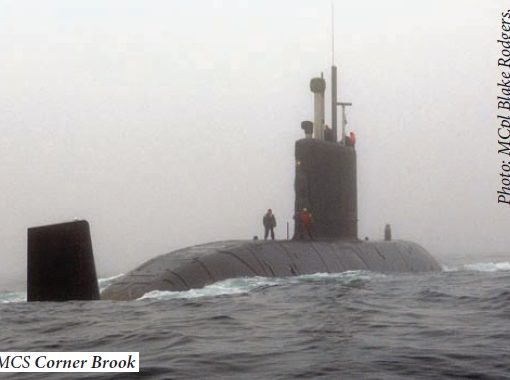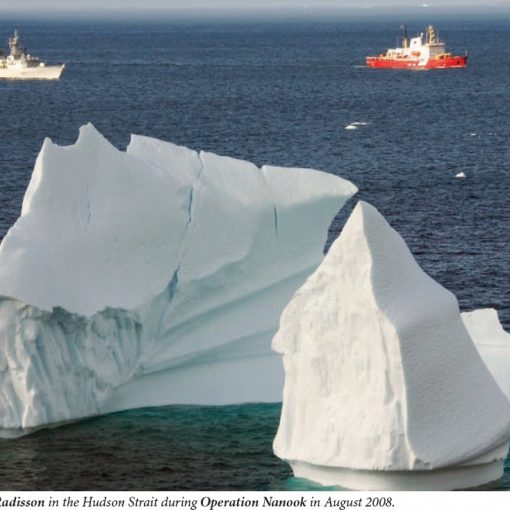There appear to be few internationally contentious issues that Canada faces regarding its claims of sovereignty over its arctic landmasses, including its archipelago, aside from a minor challenge concerning Hans Island. The situation in the Arctic Ocean and its adjoining waters is less clear. While several minor maritime boundary challenges exist in the Lincoln and Beaufort Seas, and the extent of the extended continental shelf still awaits resolution; it is the Canadian Northwest Passage that presents the greatest uncertainty.
While there appears to be only one area of major contention, the Northwest Passage, the Canadian Government would have us believe that Canada’s sovereignty over its Arctic landmass and waters is open to multiple and significant challenges. Unless there are machinations that have not made it into the open literature, this is simply not so. Indeed the idea of sovereignty in the ocean domain is nuanced and governed by the 1982 United Nations Conference on the Law of the Sea (UNCLOS), which Canada ratified in 2003. Furthermore, regardless of assertions to the contrary, no nation has complete sovereignty over the North Pole – not Russia, not Denmark/Greenland, nor Canada; although a limited kind of sovereignty may exist for one or some of these nations once the extended continental shelf deliberations are concluded.
Under UNCLOS, navigable waters are defined as either:
- internal waters (landward of baselines),
- territorial seas (up to 12 nautical miles from baselines),
- a contiguous zone (from 12 to 24 nautical miles from baselines),
- an exclusive economic zone (EEZ) (out to 200 nautical miles from baselines), or
- an extended continental shelf (outside of the EEZ to no more than 350 nautical miles from baselines subject to technical determinations).
A nation’s degree of sovereignty in these zones decreases the further one ventures from the shore. The full force of Canadian law applies only within its internal waters and territorial seas. However, a right to innocent passage exists in Canada’s territorial seas. This right to innocent passage does not exist in its internal waters except under some conditions when waters have been newly made internal (UNCLOS Article 8). In the contiguous zone, Canada can take action to prevent the infringement of its customs, fiscal, immigration and sanitary laws and regulations, but cannot restrict ship movement or aircraft over flight. In the exclusive economic zone (EEZ), Canada’s sovereignty is limited to the right to manage, exploit and regulate the living and non-living resources and enact anti-pollution regulations. In the outermost zone, the extended continental shelf, Canadian sovereignty extends only to managing, exploiting and regulating the non-living resources on and below the sea-bed with the results of exploitation subject to a sharing of proceeds under UNCLOS Article 82.
There are some commentators who argue that the Arctic Ocean basin including the neighbouring states EEZs should be considered under a special regime with resources exploited and shared for the common good of mankind. However, this would require a major departure from UNCLOS that 160 states have ratified. Until that unlikely event, the living and non living resources in the Canadian EEZ and the non living resources in the yet to be agreed extended continental shelf are Canada’s to manage and regulate.
Canada established straight baselines to encompass its arctic archipelago as allowed under UNCLOS article 7 making these waters internal, subject to absolute Canadian sovereignty. However, UNLCLOS article 8 requires that innocent passage be allowed when straight baselines are established where they had not previously existed. Encompassing these waters as internal waters is controversial with the United States, the European Union and several others claiming that the navigable channels in this archipelago are international straits with a right of transit passage.
Articles 17-25 of UNCLOS describe the meaning of innocent passage and the responsibilities of the coastal state, foreign ships and the foreign flag state. In essence the passage must be continuous and expeditious, it cannot be prejudicial to the peace, good order or security of the coastal state and submarines must transit on the surface and show their country’s flag. Foreign vessels are prohibited from polluting, fishing and carrying out research and survey activities amongst other prohibitions. Furthermore, Canada is allowed to adopt laws and set regulations pertaining to the safety of navigation and the regulation of maritime traffic including the establishment of sea lanes and traffic separation schemes and the preservation of the environment among other rights.
The United States and the European Union claim that the Northwest Passage is an international strait with the attendant right to transit passage. Transit passage shares many attributes of innocent passage. It allows ships the freedom of navigation and aircraft over flight solely for the purpose of continuous and expeditious transit. It allows Canada to establish sea lanes and traffic separation zones, to prevent fishing and pollution and research and survey activities. However, unlike innocent passage, ships and notably aircraft would be allowed to transit in their normal modes of operation (e.g. submarines can remain submerged) so long as there is no threat or use of force.
Part of the Canadian concern with making the Northwest Passage internal waters has to do with environmental stewardship. As previously indicated, Canada has the right to make and enforce anti-pollution laws and regulations under either the innocent passage regime or the international transit regime. Furthermore, the International Convention for the Prevention of Pollution from Ships has been widely ratified by a significant majority of Flag State countries. UNCLOS Article 234 goes even further allowing Canada and other Arctic coastal States to take special measures in the Arctic:
Article 234 - Ice-covered areas.
"Coastal States have the right to adopt and enforce non-discriminatory laws and regulations for the prevention, reduction and control of marine pollution from vessels in ice-covered areas within the limits of the exclusive economic zone, where particularly severe climatic conditions and the presence of ice covering such areas for most of the year create obstructions or exceptional hazards to navigation, and pollution of the marine environment could cause major harm to or irreversible disturbance of the ecological balance. Such laws and regulations shall have due regard to navigation and the protection and preservation of the marine environment based on the best available scientific evidence. Furthermore the International Maritime Organization (IMO) is actively pursuing the establishment of a Polar Code that will apply obligatory standards for ships using the polar seas to help protect all of the polar seas."
It appears that UNCLOS provides Canada with all of the authorities it needs to safeguard the Canadian arctic maritime environment, regulate the exploitation of its resources, and to control the movement of shipping therein. The only significant difference between innocent passage and transit passage is that transit passage allows ships and submarines to pass in their normal modes of operations, which may be of concern regarding submerged submarines; and that over flight is allowed, which may be of a military concern – however, foreign military aircraft over flight would be limited to the confines the Northwest Passage that are designated an international strait. Having said this, it is useful to note that commercial aircraft use Canadian northern airspace for transpolar flights under Canadian control today.
Canada could face actual challenges to its assertion that the Northwest Passage is internal waters when the Arctic ice cap melts sufficiently; however, the challenges will be mitigated by the pattern of the melt. Scientific studies indicate that the Northern Sea Route off of Russia and the Transpolar Route through the central Arctic Ocean should be more feasible to commercial traffic. Ice pile up in the approaches to the northern exits to the Northwest Passage may also mute these challenges.
The validity and universal applicability of UNCLOS should be central to Canada’s position. Canada stands to lose little whether the Northwest Passage is considered internal waters with the right of innocent passage or an international strait with the right of transit passage save the differences between these regimes, which are candidly military related dealing with submerged submarine transit and aircraft over flight. Should Canada persists in pursuing a position outside of UNCLOS by declaring the Northwest Passage as internal waters without the right to innocent passage, then it should expect little support from the United Nations, world opinion, and the International Court of Justice when it faces challenges, leaving police and military action as its only recourse.



